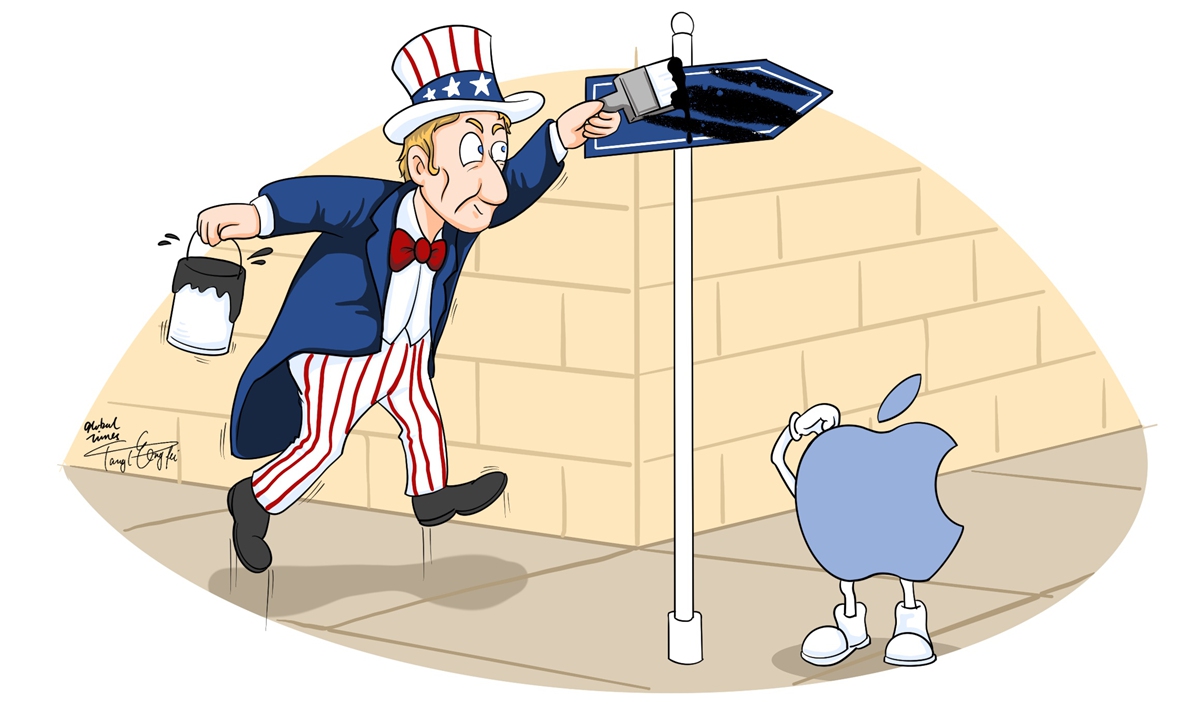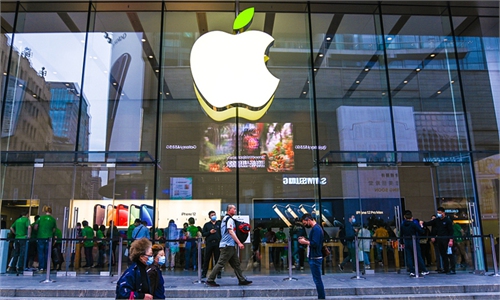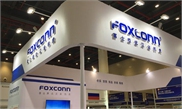COMMENTS / EXPERT ASSESSMENT
Using Xinjiang lies to hijack Apple Inc may hurt firms’ development

Illustration: Tang Tengfei/GT
A US congressional commission on Tuesday released a statement forcing Apple Inc to take sides on the fabricated Xinjiang human right issues, the latest development of the US-led vilifying Xinjiang campaign in order to suppress China's development.
Without any valid evidence, the US Congressional-Executive Commission on China (CECC) urged Apple CEO Tim Cook to "ensure that Apple's supply chains are free of forced labor and to divest from Chinese suppliers" who were framed being involving in so-called forced labor issue, particularly from Northwest China's Xinjiang Uygur Autonomous Region.
Though it is a newly setup stage by the US-led clique to vilify Xinjiang, the underlying logic is no different than other stories written by the West used to hold back China. There have been firms clarifying that there's no evidence support the accusation after independent investigation, including the US-based Skechers and Japan-based MUJI. Apple also stated that they found no evidence of forced labor anywhere they operate. The truth is that "forced labor" story is only a guise.
Among a round of measures launched by the Biden administration from ganging up with its allies to playing up slandering China games, the strategy of the new US government may appear different from that of the Trump era, but Washington's intention of maintaining its hegemony across the world does not change.
With a comprehensive decoupling China plan looking far from realistic, the US, by hijacking its own and its allies' firms to take sides, has been seeking to realize a partial decoupling in particular sectors, so as to buy some time for the development of its own industries.
The problem is where to find an alternative if the firms choose to take sides as the Western politicians hoped and leave the Chinese market, since choosing to back unfounded Xinjiang rumors and interfere in China's internal affairs is simply not acceptable to the Chinese people.
The response from the multinationals operating in China may have already revealed by their accelerating efforts to boost presence in the Chinese market. Repeated surveys among European and American firms have shown willingness to expand investment in China, instead of leaving it.
Apple Inc's quarterly revenue surpassed $100 billion for the first time in the fourth quarter of last year, in which its sales in China surged 57 percent to a record $21.3 billion. The significance of the Chinese market for multinationals like Apple is plain for all to see, even though they are facing mounting pressure from anti-China politicians. The firms may take more resilient strategies to withstand the pressure in the future, but leaving Chinese market is not a choice for them.
Moreover, the leadership of the US among its allies is clearly less strong when it comes to topics such as decoupling China. For starters, no matter whether the EU or Japan, they do not share the same intention with the US which is afraid of losing its hegemony and being surpassed by China.
Under a "shared value" cliché, Washington's seemingly close allies, however, have their own interests in mind. Putting aside that there will be instant losses for those allies if they choose to strip from the Chinese market; more importantly, there is distinct history recording that the US used to gather its allies to confront a "common rival" while opening a backdoor for its own firms to do business with that "common rival".
Besides, even with the US constantly abusing its power to force others to take sides, many of the countries and regions prefer to stay away from wrestling between the two giant economies to avoid unnecessary risks for their long-term national interest.
As for China, it has been committed to opening up its market to the world and to cultivate a better business environment for all firms at home and overseas. Though the competition in the market has emerged increasingly fierce, it still offers the most promising future for global businesses, including Apple.
The article was compiled based on an interview with Wang Yiwei, director of the institute of international affairs at Renmin University of China. bizopinion@globaltimes.com.cn



